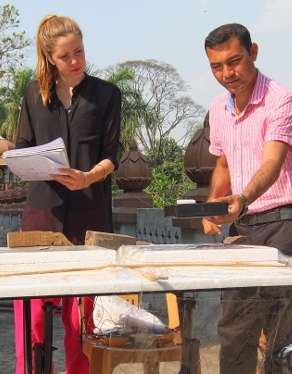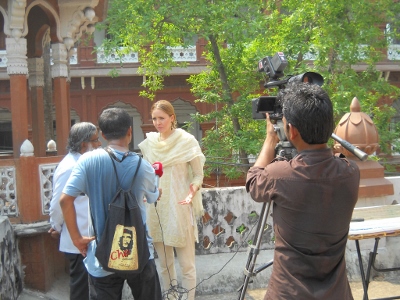Safe drinking water in Bangladesh
Erika Lundgren, a master student in Environmental and Water Engineering at Uppsala University, did her Minor Field Study in collaboration with the ISP-supported research group in Biomedical Physics & Technology at University of Dhaka, Bangladesh.
Where did you go and what was your research subject?
I did my Minor Field Study in Bangladesh at the department of Biomedical and Physics at University of Dhaka. I studied low cost water treatment using solar pasteurisation as a method to disinfect surface water, with the objective to optimize a semi-permanent device that can deliver safe drinking water to people living in rural areas. I chose to go to Bangladesh since I lived there with my family when I was younger and it will always have a special place in my heart. When I got in touch with Professor Rabbani and was introduced to his project on solar water pasteurisation I was convinced that this was the subject of my Master thesis.

Did your reach lead to any interesting results?
Yes, the study showed that the most important factors to disinfect the water were solar radiation and time. Since the water temperature is crucial to get safe drinking water, it was concluded that improved isolation to a low cost is of high importance. The most significant result was achieved using larger thickness of air gap in the device, which showed to be more efficient than smaller ones to maintain the heat from solar radiation. However, further testing of the semi-permanent device in the rural areas is needed to complete the study.
What would you say are the most important experiences from your time in the field?
The study gave me knowledge of how important it is to have a good cultural understanding when implementing new methods. I also got to experience how to solve unexpected problems along the way and learned that things don't always turn out as you planned - usually they turn out even better. During my time abroad I really connected with the locals and I was able to take part of their culture and traditions. These moments was as important as the study it self and gave me memories for life.

Erika being interviewed by the regional TV-channel, Somoy Television, who made a program about the different solar pasteurisation methods that the Dhaka research group have developed.
Do you recommend others to apply for a MFS grant?
I definitely recommend others to apply for a MFS grant; it is by far the best experience of my life. You get a chance to meet new people and to take part of a new culture. Doing a Minor Field Study is not only a great knowledge experience it also put things in a global perspective. The research makes you contribute to a broader understanding and gives you an opportunity to establish international contacts. I would really recommend you to do a MFS if you are interested in working on an international level in the future.
By applying for MFS through ISP I got great support and contact with professors and projects that already where established. This facilitated the field study and made it possible to get the most out of the time abroad.
More information
Name: Erika Lundgren
University: Uppsala University
Program: Master Program in Environmental and Water Engineering
MFS period: January-April 2013
Erika Lundgren did her Minor Field Study in collaboration with the ISP-supported research group in Biomedical Physics & Technology at University of Dhaka, Bangladesh.
MFS-Thesis
Read the MFS thesis: A method for water disinfection with solar pasteurisation for rural areas of Bangladesh Pdf, 9 MB.
